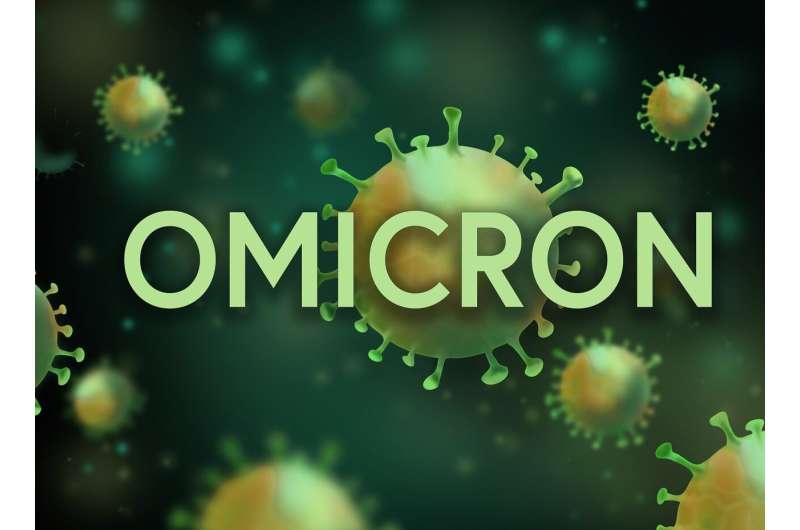The scientific race to understand the omicron variant

Late last year, preliminary studies revealed that the fast-spreading omicron SARS-CoV-2 variant was likely to evade COVID-19 antibodies but, in many people, less so than expected. Now one of those studies from Karolinska Institutet has been published in the journal The Lancet Infectious Diseases. KI researcher Ben Murrell explains the findings and recalls the rush to understand the new variant.
In late November 2021, a new SARS-CoV-2 variant was identified by scientists in South Africa, which later came to be known as omicron. Along with early signals that it was spreading quickly, international alarm was raised by the number of mutations on omicron's spike protein, which is the part targeted by neutralizing antibodies. This kicked off a scientific rush to characterize just how extensively omicron would evade neutralizing antibodies.
"These days, we'd usually use gene synthesis to create the new spike gene to measure antibody neutralization," says Ben Murrell, assistant professor at the Department of Microbiology, Tumor and Cell Biology, Karolinska Institutet, and the study's last author.
When news of the variant first broke, Ben Murrell placed a synthesis order. However, soon after this, cases started appearing in Europe, and Ben Murrell's lab realized that there might be a faster way to create an omicron neutralization assay.
Through a collaboration with Professor Jan Albert, who has been sequencing SARS-CoV-2 variants in Sweden, Ben Murrell's lab obtained an anonymized sample from a suspected omicron infection. They were able to clone the portion of the spike gene containing the omicron mutations into the spike backbone that they use for their neutralization assay.
Moved at breakneck speed
"Daniel Sheward, who runs these assays in my lab, was exceptionally fast. We were able to release our first neutralization results eight days after obtaining that sample, which was just 13 days after the variant was reported to the WHO," says Ben Murrell.
As the researchers were approaching their final step, they reached out to colleagues in South Africa who were also working on understanding the new variant, but using a different approach.
"The South African labs had had access to omicron samples since the start and were trying to grow live omicron virus in the lab, and use this to measure neutralization," says Ben Murrell. "They told us that they were also generating their initial results at about the same time as us, so we decided to compare notes and then release data right away."
But when they compared notes, the South African results looked different. The South African data showed a much more substantial loss of antibody neutralization against omicron than data from two cohorts from Stockholm. The results from Stockholm also suggested that the loss was extremely variable, with some people neutralizing omicron nearly as well as they neutralized the original SARS-CoV-2 variant, but others losing a lot of potency against omicron.
Urgent need for answers
"This initial disparity was extremely nerve wracking at first. It was an important question to answer quickly, but absolutely critical for this answer to be correct," explains Ben Murrell.
The lab spent the next hours double-checking everything as much as possible, and then released their data publicly, along with caveats appropriate for preliminary results like these. In the following days and weeks, other labs began to release data.
"The picture became very clear. The ability to cross-neutralize omicron seems to depend strongly on how many times your immune system has been exposed, either via infection or via vaccination, to the SARS-CoV-2 spike," explains Ben Murrell.
This is why data from a previously-infected then vaccinated cohort of Stockholm hospital workers exhibited much more substantial cross-neutralization of omicron than the cohort studied in South Africa.
"It was interesting to see that randomly selected Swedish blood donors also exhibited substantial omicron neutralization—not as much as the hospital workers, but more than we originally expected," adds Ben Murrell.
A few days later, the lab released neutralization data for clinically relevant monoclonal antibodies, which are used to treat COVID-19. These showed that many therapeutic antibodies are rendered ineffective by omicron. One of these, Sotrovimab, retained most of its potency against omicron, which agreed with data that had just been released by the developers of Sotrovimab. Ben Murrell cautions: "Our data were from the BA.1 omicron lineage, which was dominant at the time, but more recent data from other labs shows that BA.2, which is overtaking BA.1 globally, appears to be different here."
Vaccination matters
The publication, which has now been peer-reviewed, documents those initial results, and has added a few more, increasing the size of the random blood donor cohort, where the picture was unchanged, and including previously-infected samples taken before vaccination.
"These infected but non-vaccinated samples showed a complete loss of neutralization against omicron, which suggest that you cannot rely on natural infection to make good antibodies against these more mutated variants—you must also get vaccinated," says Ben Murrell. "The cross-neutralization that we saw in people who had been infected then vaccinated was subsequently confirmed to also occur in people who received a third booster vaccine dose."
More information: Daniel J Sheward et al, Neutralisation sensitivity of the SARS-CoV-2 omicron (B.1.1.529) variant: a cross-sectional study, The Lancet Infectious Diseases (2022). DOI: 10.1016/S1473-3099(22)00129-3




















